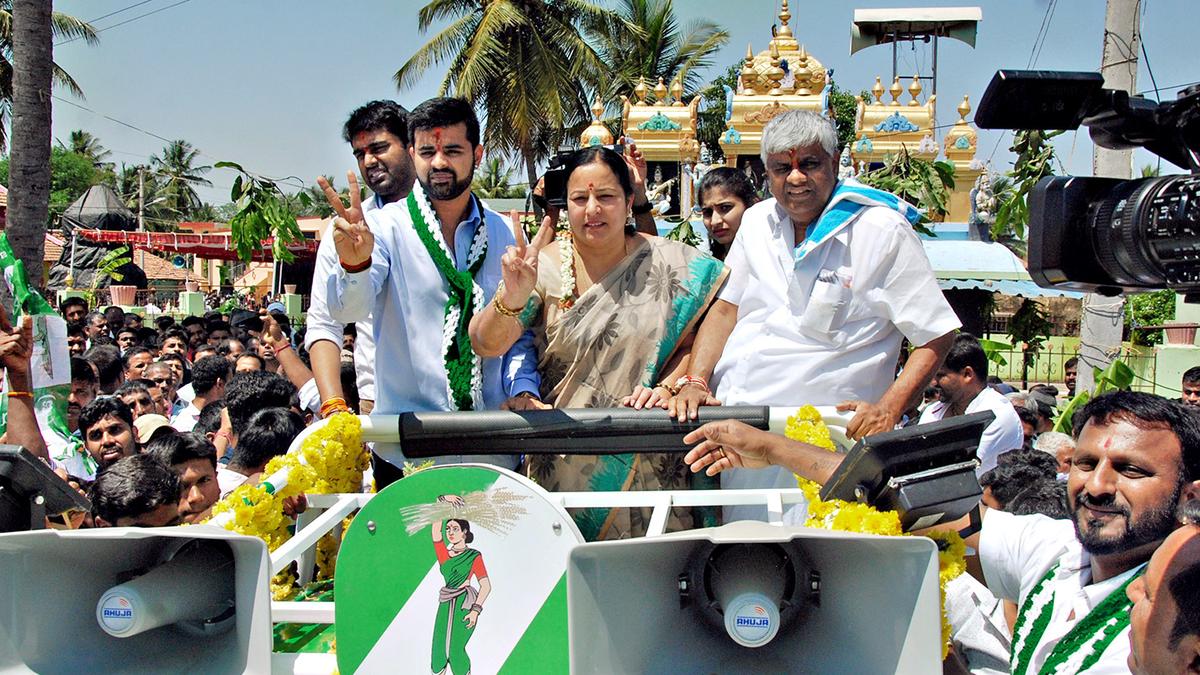
Here are the big stories from Karnataka today
The Hindu
Karnataka Today newsletter: Trouble mounts for Revanna father-son duo as more victims emerge, and more
In the rape case registered against Prajwal Revanna in Bengaluru on May 1, a 44-year-old political worker has accused the Hassan MP of raping her in his official quarters in Hassan city in 2021. The complainant told the Criminal Investigation Department (CID) that the JD(S) leader allegedly threatened to kill her and her husband if she did not cooperate before raping her at the MP quarters in Hassan city in 2021. She alleged that Prajwal Revanna recorded the sexual act on his phone and blackmailed her with the footage, forcing her to have sex with him multiple times between January 1, 2021, and April 25, 2024.
Meanwhile, his father and former Minister H.D. Revanna has now been booked for kidnapping one of the alleged victims sexually abused by Prajwal. The alleged victim earlier worked as a maid in H. D. Revanna’s household for six years. A video of her being ‘raped’ by Prajwal Revanna is in circulation, police sources said. Read The Hindu’s complete coverage of the case here.
Leader of the Opposition in the Legislative Assembly R. Ashok, who is the BJP’s Vokkaliga face in Karnataka, accuses Chief Minister Siddaramaiah of trying to reduce the Lok Sabha elections to the level of Assembly polls as the Congress cannot compete with the BJP on national issues.
In an interview with The Hindu, he points out that the Congress’ poll narrative in Karnataka does not mention national issues, or its own national leaders, fearing that they cannot be compared with BJP stalwarts. Read excerpts from the interview.
Prime Minister Narendra Modi addressing a poll rally in Rajasthan’s Tonk-Sawai Madhopur Lok Sabha constituency on April 23, accused the Congress of “snatching the reservation of SCs, STs and OBCs and providing it to Muslims through the backdoor”, tying it up with his charge that “Congress would redistribute the wealth of people to Muslims”. He claimed that Congress had already done so in Karnataka and said it was “against the spirit of the Constitution” as it did not allow reservation on religious grounds.
With regards to the 4% reservation provided to Muslims under Category 2B of the OBC reservation matrix in the State, he said that “religion-based reservation affects and works against the ethics of social justice”. Is Muslim Reservation new in Karnataka? How are Muslims categorised in the OBC reservation matrix of Karnataka? Read here.

“Writing, in general, is a very solitary process,” says Yauvanika Chopra, Associate Director at The New India Foundation (NIF), which, earlier this year, announced the 12th edition of its NIF Book Fellowships for research and scholarship about Indian history after Independence. While authors, in general, are built for it, it can still get very lonely, says Chopra, pointing out that the fellowship’s community support is as valuable as the monetary benefits it offers. “There is a solid community of NIF fellows, trustees, language experts, jury members, all of whom are incredibly competent,” she says. “They really help make authors feel supported from manuscript to publication, so you never feel like you’re struggling through isolation.”

Several principals of government and private schools in Delhi on Tuesday said the Directorate of Education (DoE) circular from a day earlier, directing schools to conduct classes in ‘hybrid’ mode, had caused confusion regarding day-to-day operations as they did not know how many students would return to school from Wednesday and how would teachers instruct in two modes — online and in person — at once. The DoE circular on Monday had also stated that the option to “exercise online mode of education, wherever available, shall vest with the students and their guardians”. Several schoolteachers also expressed confusion regarding the DoE order. A government schoolteacher said he was unsure of how to cope with the resumption of physical classes, given that the order directing government offices to ensure that 50% of the employees work from home is still in place. On Monday, the Commission for Air Quality Management in the National Capital Region and Adjoining Areas (CAQM) had, on the orders of the Supreme Court, directed schools in Delhi-NCR to shift classes to the hybrid mode, following which the DoE had issued the circular. The court had urged the Centre’s pollution watchdog to consider restarting physical classes due to many students missing out on the mid-day meals and lacking the necessary means to attend classes online. The CAQM had, on November 20, asked schools in Delhi-NCR to shift to the online mode of teaching.









